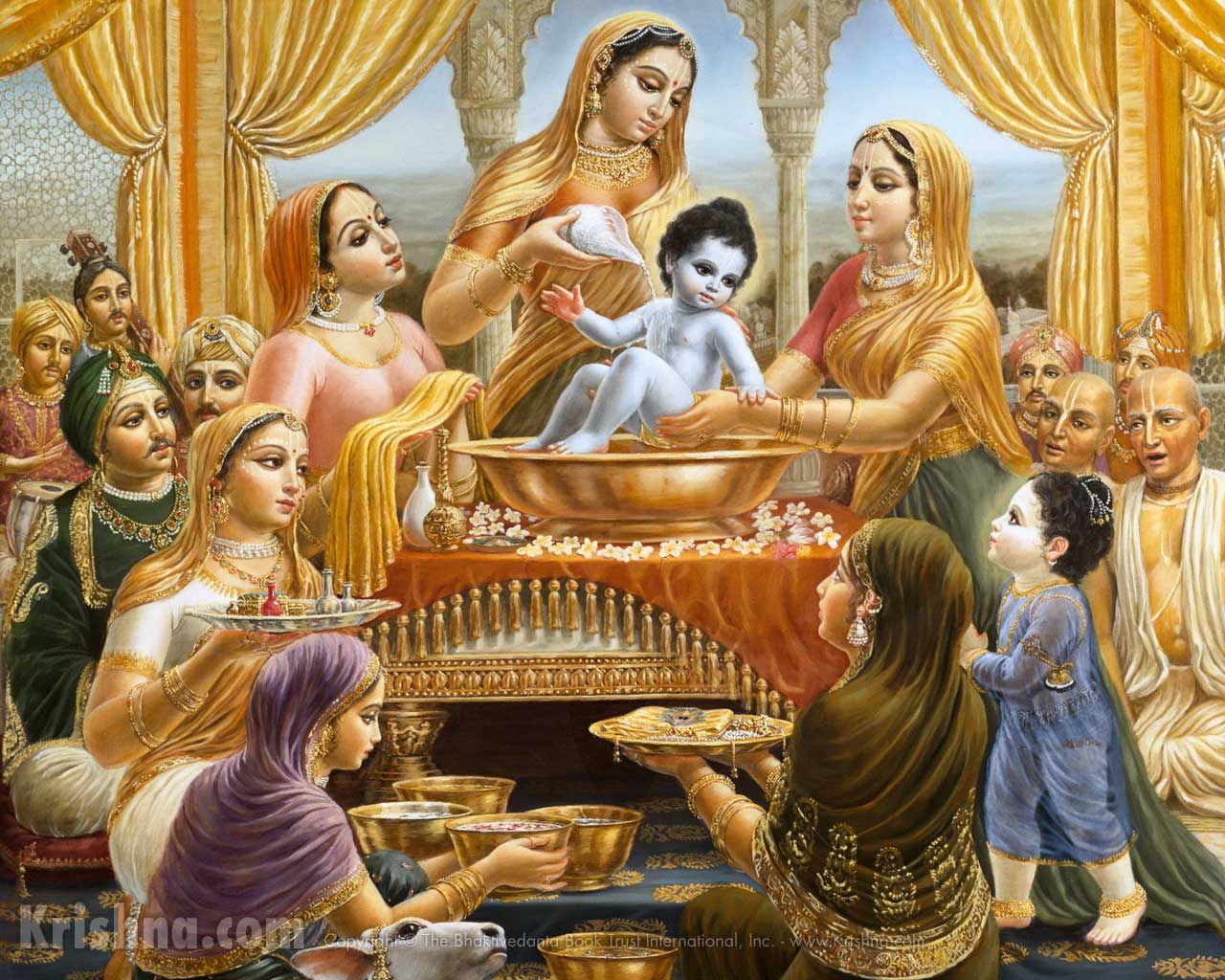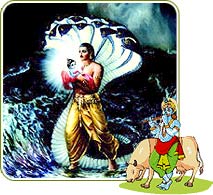 Lotus Feet of Srimati Radharani and Lord Krishna
Lotus Feet of Srimati Radharani and Lord Krishna

Lotus Feet of Sri Krishna

Lotus Feet of RadheRani
Text 1
candrardham kalasam tri-kona-dhanushi kham goshpadam proshthikam
sankham savya-pade 'tha dakshina-pade konashtakam svastikam
cakram chatra-yavankusam dhvaja-pavi jamburdhva-rekhambujam
bibhranam harim unavimsati-maha-lakshmy-arcitanghrim bhaje
I worship Lord Hari (Krishna), whose feet are endowed with the 19 great opulences of, on the left foot, the halfmoon, water-pot, triangle, bow, sky, cow's hoofprint, fish, conch, and on the right foot, the eight-pointed star, svastika, wheel, parasol, barleycorn, elephant-goad, flag, thunderbolt, jambu fruit, urdhva-rekha, and lotus.
Text 2
cchatrari-dhvaja-valli-pushpa-valayan padmordhva-rekhankusan
ardhendum ca yavam ca vamam anu ya saktim gadam syandanam
vedi-kundala-matsya-parvata-daram datte 'nv asavyam padam
tam radham ciram unavimsati-maha-lakshmy-arcitanghrim bhaje
I worship Sri Radha, whose feet are endowed with the 19 great opulences of, on the left foot, the parasol, ari, flag, vine, flower, bracelet, lotus, urdhva-rekha, elephant-goad, halfmoon, and barleycorn, and on the right foot, the sakti, club, chariot, altar, earrings, fish, mountain, and conchshell.
Meaning of the Auspicious Marks:
HALF-MOON (ardha-candra) - This mark symbolizes how lotus feet truly provide the desired objectives of the devotees. It signifies that even devatas like Lord Siva (whose symbol is a half moon) have decorated their own heads with the soles of the feet. It also shows that devotees who likewise decorate their own head with the feet can become exalted like Lord Siva. Just as the moon showers nectar with its cooling rays, similarly the lotus feet shower nectar upon the devotees, extinguishing the threefold material miseries. So that the minds of the devotees may reside at the feet, they bear the symbol of the moon (which is the devata or presiding deity of the mind) upon the feet. Just as the moon is one, yet it destroys the darkness seen by many people simultaneously, similarly the Lord is one and yet by His cleverness can deliver many souls at the same time. The half-moon also indicates that since Lord's toenails appear like ten splendorously full moons, the real moon has shriveled up in shame and appears in half-form.
PITCHER (kalasa) - This mark shows that lotus feet hold the golden pitcher full of purely nectarean ambrosia to be freely consumed by the surrendered souls; indeed, they will never be bereft of nectar for this pitcher always remains full. This mark also indicates that the feet can pour out nectar that extinguishes the blazing three-fold miseries of the separated devotees. The full pitcher is a symbol to show that no inauspiciousness can come near the devotees. Rather the feet bring ripples of happiness emanating from divine auspiciousness.
BOW (dhanu) - This mark reveals that those who take shelter of the lotus feet will be perpetually free from all worries and difficulties. It also shows that those who are stupefied in the material world remain motionless like a target and do not come to lotus feet. Whereas those who come to the ultimate goal of the feet remain there and never go back to the material world. Further, when the mind of the devotee meets the target of the feet, then prema condenses as a result and overflows as the tears showering from their eyes.
SKY (ambara) - This mark indicates that the feet are all pervading throughout the entire creation, both within and without all manifestations. It also shows that even though the feet are everywhere, they are unattached just like the sky.
COW-HOOF (gospada) - This mark signifies that for those who have taken full shelter of uninterrupted meditation on the feet, the great ocean of worldy existence becomes very small and insignificant like the water held in a calf’s hoof-print and is thus easily crossed over.
FISH (matsya) - This mark shows that just as a fish cannot live without water, similarly the surrendered devotees cannot live a moment without directly associating with the feet. It also shows that all the most cherished desires and longings of those who resort to lotus feet will be truly fulfilled. It also means that the mind is very fickle, just like a fish who wavers this way and that, and so only after much meditation do the feet finally come into the heart. It also indicates that lotus feet will come to live in one’s heart only if the heart has been liquefied by soft loving emotions; the feet do not thrive where it is dry.
CONCH (sankha) - This auspicious mark indicates that those who take shelter of the lotus feet are always rescued from all sorts of distress. Just as during the arati ceremony the conchshell is used to hold water that is offered directly after the fire of the ghee-lamp, similarly lotus feet hold transcendental water that soothes His devotees from the blazing fire of material miseries. Also this symbol proclaims ultimate victory for the devotees, since the conchshell mark on the feet contains the entire ocean of material existence that may now be easily crossed. This mark also shows that those who resort to lotus feet become completely fearless.
DISK (cakra) - This mark cuts down the six enemies of the devotees - lust, anger, greed, illusion, envy and bewilderment. It indicates teja-tattva, or the principle of brilliance by which Lord destroys the darkness of sins from within His devotee’s hearts.
GOAD (ankusa) - This mark indicates that meditation on lotus feet brings the elephants of the devotee’s minds under control and keeps them on the right path. It also shows that those who thus stay on the path toward the feet become superior among men, just as one riding on top of an elephant travels far above the rest.
FLAG (dhvaja) - This mark announces that for the devotees meditating on the feet, They give security and safe protection from all sorts of fear.
THUNDERBOLT (vrajra) - This mark reveals that meditation on lotus feet smashes to pieces the mountain of the devotee’s karmic reactions to past sins. It also indicates that whoever holds on to the feet becomes as exalted as Lord Indra (whose weapon is the thunderbolt).
LOTUS (kamala) - This mark increases greed for nectar in the minds of the beelike devotees who meditate on lotus feet. The lotus also signifies that just as a lotus grows out of water, similarly those whose eyes swell with tears upon holding the Divine lotus feet to their heart receive the highest benefit. This mark also shows that the goddess of fortune, Sri Laksmi Devi always resides at His feet rendering humble service. It signifi es that His feet are so soft that they can only be compared to lotus petals; indeed upon first glancing at the lotus feet, you would think you are directly seeing fresh lotus blossoms. It also reveals that just as a lotus blooms by day and contracts by night, similarly those who remain steeped in meditation on lotus feet always feel the blossoming unfoldment of brilliant sattvika ecstasies that dispel the darkness of ignorance. It also means that the bee of the devotee’s mind cannot fly beyond the bondage of dry jnana (knowledge) and vairagya (renunciation) without the temptation offered by the superior nectar of the lotus feet.
FLOWER (puspa) - This mark shows that the divine fame of the feet spread everywhere just like the fragrance of a flower. It also shows that the feet are not hard, but soft as flower petals. And it means that just as every fruit comes into being after the plant blooms, similarly all spiritual fruits come into being after first blossoming at the soles of the feet.
CLUB (gada) - This mark is to show that lotus feet are capable of chastising the elephant of sinful lust. It further indicates that for whoever takes shelter of the feet, all their ancestors will also receive benefit.
ALTAR (vedi) - This mark proclaims that the sins of those who meditate upon the feet are burned up as if on the
altar of sacrifice. Furthermore, it indicates that just as the universe is nourished by the brahmanas offering fire-sacrifices, similarly those who offer their minds in sacrifice to the feet stimulate universal nourishment
that affects all of creation.
UMBRELLA (catra) - This mark proves that those who take shelter of lotus feet are shielded from the incessant rainfall of material miseries. It also denotes that those who sit in the shade of the feet become exalted just like maharajas (great kings), who usually have umbrellas held over their heads.
Read more…










